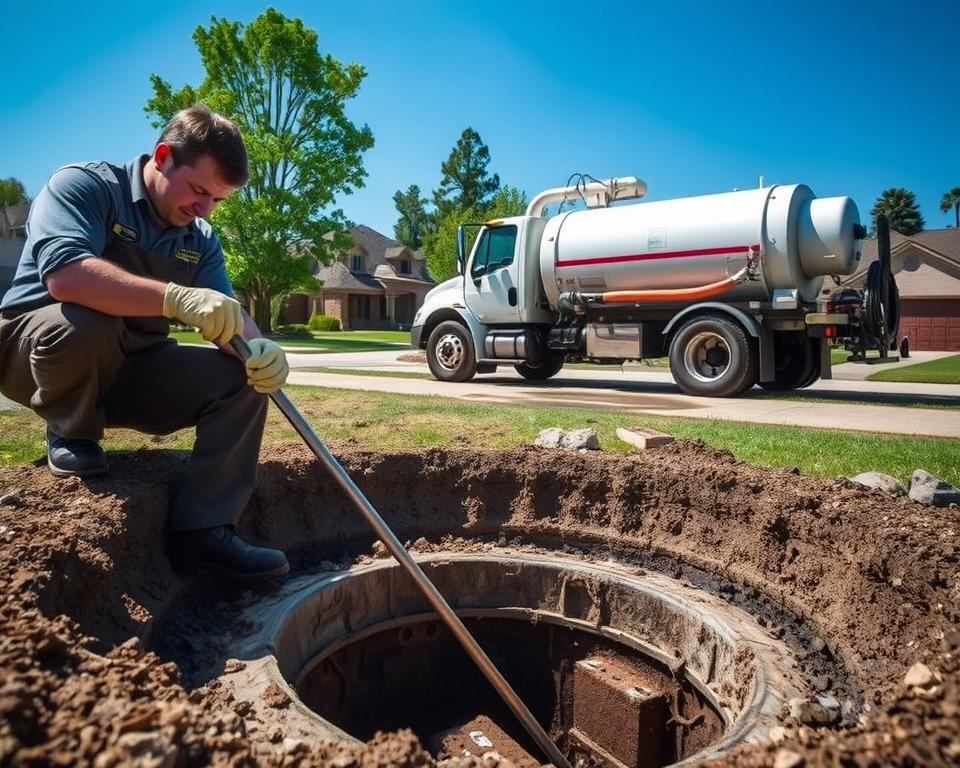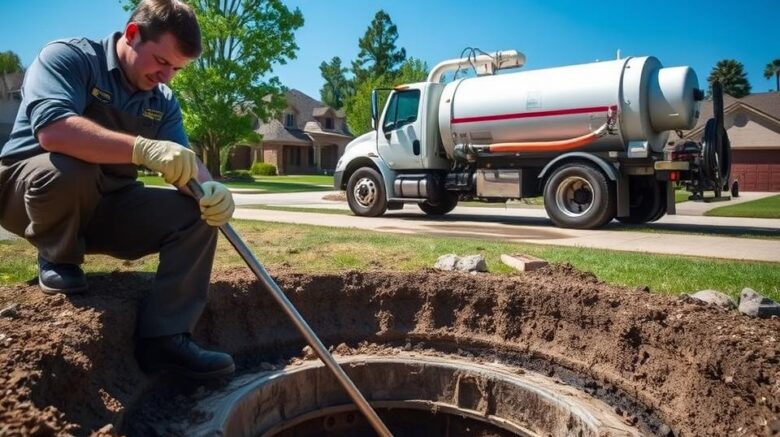Keep Septic System Cleaning for Tank Health
Ever wondered concerning the ramifications of ignoring septic system maintenance? For homeowners relying on these installations for waste management, skipping routine care can result in hefty costs. It also creates risks to both well‑being and the surroundings. Cleaning your septic system isn’t just a quick task; it’s vital for making sure your household operates smoothly. By consistently clearing out your septic tank, you prevent sludge build‑up and lengthen the service life of your unit. This preventive strategy lets you avoid any undesirable events. Discover the significance of septic tank maintenance and the steps entailed with septic tank pumping.
Highlight Reel
- Routine septic system cleaning is vital for avoiding costly fixes.
- Neglecting maintenance can result in health hazards for your loved ones.
- Understanding your septic system helps in effective care.
- Signs of a failing septic system should be noticed promptly.
- Professional contractors can assist in preserving excellent tank health.
Grasping Your Septic System
A septic system is an effective in‑situ method for handling wastewater. It mainly consists of two components: the septic tank and the absorption field. Both are vital for delivering proper sanitation and protecting the surroundings.
The septic tank gathers wastewater from your home. There, waste solids sink to the bottom, and effluent drift to the top. Beneficial microbes within the tank decompose the biomatter, making the effluent more manageable to process. This initially processed wastewater then moves to the leachfield for extra cleanup by the soil, finishing the treatment.
It’s crucial for homeowners to understand the workings of their septic system. Grasping how the septic tank and field operate in tandem can lead to improved system care. This insight promotes effective maintenance strategies, helping guarantee the system’s durability.

Significance of Regular Septic System Cleaning
Routine cleaning of the septic system is key for home and ecological health. If neglected, unprocessed wastewater can leak into your yard. This overflow may result in subsurface water contamination, creating dangerous conditions. By maintaining the septic system clean, you shield your loved ones and the ecosystem.
It’s advised to pump the septic system every 3‑5 years, according to how much you rely on it. Such maintenance is not just eco‑friendly; it heads off big bills. A septic system that’s well‑maintained functions more efficiently, providing a safer home environment and a cleaner environment.
Indicators Your Septic Tank Needs Cleaning
Homeowners need to spot clues that their septic tank may need pumping. Common symptoms to monitor are:
- Sluggish drainage in washbasins, bathtubs, and lavatories
- Foul odors near the drainfield
- Sewage overflows in household plumbing
- Persistent wet areas or lush sections of grass above the septic system
It’s important to spot these warnings quickly to avoid significant septic tank issues. Scheduled inspections are vital. They detect issues before they turn into costly fixes. Examining your system periodically confirms it functions well and lasts longer.
Keeping watch and responding quickly are essential for septic system care. By paying close attention to these alerts, you can preserve your septic system in optimal health.
Septic System Pumping Intervals
Servicing your septic system on schedule is key to ensuring your home’s plumbing in excellent condition. Professionals generally suggest servicing the septic tank every three‑to‑five years. However, this can vary according to the capacity of your household, how much water is consumed, and the volume of your tank.
If you have a high‑occupancy household that draws more water, you might need to pump the system more frequently. Tracking your water consumption can guide you on if you need to revise your service schedule.
All in Sanitation recommends setting up a consistent pumping schedule that suits your household’s specific needs. Sticking to a set maintenance program keeps your septic system operating effectively and avoids expensive fixes.
Septic System Cleaning: Best Practices
For a septic system to remain sound, homeowners must practice key guidelines. It’s vital not to flush items that won’t break down; doing so prevents blockages and keeps the system functioning properly. Similarly, limiting household chemical usage preserves the essential bacterial ecosystem. These measures are vital for the system’s durability and efficiency.
Taking initiative with regular inspections is key. Setting up periodic inspections can catch issues early, allowing for prompt fixes. Additionally, saving water through stopping leaks and conscious usage aids septic tank health. These steps ensure the system runs efficiently for a long time.
It’s also important not to park on the leachfield. Keeping this area open allows it properly manage waste water, safeguarding your system from issues. Heeding advice from specialists like All in Sanitation also enhances septic system care.
The Procedure of Septic Tank Pumping
For homeowners, grasping the septic system service process is important. A licensed septic pumper should conduct regular septic tank pumping to maintain your system functioning efficiently. The first step is assessing the tank’s condition to decide when it is due for pumping.
A septic tank demands pumping once the solid layer occupy about 1/3 to half of its capacity. The licensed septic pumper will then extract these deposits. This step maintains the system’s effectiveness. Furthermore, the visit may include inspecting the tank for potential issues, allowing for prompt fixes.
Maintaining a log of each pumping visit is advisable. This log enables you to track their septic system’s upkeep, and is valuable if transferring the property. Adequate septic system maintenance improves its longevity and reliability, averting costly fixes in the future.
Septic Tank Check‑Up: What to Examine
Routine inspections are vital for your septic system’s well‑being. Using a thorough septic tank inspection checklist can reveal possible issues early. Inspections should be performed by a licensed contractor every one to two years. They will assess sludge buildup and the scum thickness during this visit.
Inspecting the baffles and outflow filters is also important. These elements are essential for your septic system’s smooth operation. Spotting seepage or issues promptly can prevent large repair costs. Forward‑thinking actions, like using an inspection checklist, enhance your system’s longevity and performance.
Expert Septic System Services
Using specialized septic system services is vital for your septic system’s health. By partnering with a company like All in Sanitation, you guarantee that experts take care of the cleaning, inspections, and fixes thoroughly. Certified experts have special know‑how, allowing homeowners to keep the system’s optimal functionality long‑term.
Upkeep by qualified pros cuts the chance of surprise breakdowns and costly repairs. These services include comprehensive inspections that assess the system’s state, locating incipient issues promptly. Taking this preventive approach significantly lengthens your septic system’s life.
Ultimately, delegating your septic system to qualified experts offers reassurance. Working alongside companies such as All in Sanitation taps into their know‑how. It ensures the integrity of your tank, building assurance in its maintenance.
Septic System Maintenance Hints for Homeowners
Homeowners have the capacity to ensure their septic systems operating reliably. Following smart care tips greatly improves their performance. Implementing straightforward tweaks to how we use water, like reducing extra use and spreading the use of appliances, reduces load on the system.
Installing efficient fixtures in your washrooms and galleys greatly bolsters septic longevity. These fixtures decrease water use without sacrificing convenience. Not using garbage disposals is prudent too, as they lead to more residue in the system, demanding extra upkeep.
Routine inspections and following a thorough maintenance plan will prolong your septic system’s lifespan. Being mindful of everything that flows into your drains is essential for preserving a healthy septic environment. By adopting these tips, you’ll significantly benefit your septic system’s operation and lifespan.
Common Septic System Fixes
Septic systems may experience various troubles over time, requiring repairs. Common concerns include seepage, damaged baffles, and percolation troubles in the drainfield. By spotting the signs at an early stage, homeowners can address them quickly, keeping their system remains in good condition.
Usual repairs include:
- Replacing faulty components to restore system integrity
- Fixing or replacing damaged pipes to prevent leaks
- Unblocking plugged lines to ensure proper drainage
Fixing septic problems swiftly not only lowers expenses over time but also lengthens the system’s life. Routine check‑ups and maintenance can help prevent these complications, supporting the upkeep of a sound septic system.
In Closing
Maintaining your septic system sound is critical to environmental and household well‑being. Consistent services and check‑ups prevent hefty bills and health risks. Taking initiative with septic care conserves resources and minimizes worry.
Engaging specialists like All in Sanitation guarantees high‑quality upkeep adapted to your requirements. Their knowledge assists spot issues early, preventing serious troubles and highlighting the need for scheduled inspections.
Adopting best practices for septic maintenance delivers long‑term system effectiveness. A small amount of maintenance now secures a better‑functioning septic system in the years ahead.
